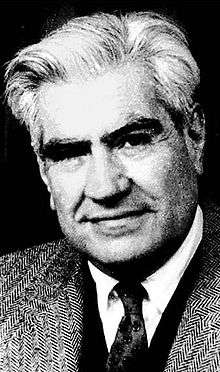Manuel Rojas (author)
Manuel Rojas Sepúlveda (Spanish pronunciation: [mãˈnwelˈroxas]; January 8, 1896 – March 11, 1973) was a Chilean writer and journalist.
Manuel Rojas | |
|---|---|
 Rojas in 1957 | |
| Born | Manuel Rojas Sepúlveda January 8, 1896 |
| Died | March 11, 1973 (aged 77) Santiago, Chile |
| Awards | National Prize for Literature (1957) |
Biography
Rojas was born in the city of Buenos Aires, Argentina, the son of Chilean parents. In 1899 his family returned to Santiago, but in 1903, after the father's death, the mother returned to Buenos Aires again, where he attended school until the age of eleven. In 1912, at the age of sixteen, he decided to return alone to Chile. Once he arrived to the country, he got involved with intellectuals and anarchist groups, while working in many different activities as an unskilled labourer: as house painter, electrician, agricultural worker, railroad handyman, loading ships, tailor's apprentice, cobbler, ship guard, and actor in small-time itinerant groups. Many of the situations and characters he encountered there later became part of his fictional world.
He returned to Argentina in 1921 publishing his first poems there. Back in Chile, he worked intensely in his narrative production and at the same time he worked in the National Library and at the Universidad de Chile press. He married María Baeza and had three children. He joined the Los Tiempos and the Las Ultimas Noticias newspapers as a linotype operator first and ultimately worked on Santiago newspapers as a journalist, all the while also working at the Hipódromo Chile (Santiago racetrack). After the death of his wife, he married again and started to travel. He received the Chilean National Prize for Literature in 1957. He toured Europe, South America and the Middle East. He became a university professor of Chilean and American Literature in the US and at the Universidad de Chile.
His works have as a central theme the representation of the instability, misery and marginality of the members of the working class. The development of the psychological and existential complexities of his characters established a difference between his work and prior literary movements (criollismo, mundonovismo), that were characterized by a less complex view of individuality. He died in Santiago on March 11, 1973.
Youth
He began to contribute to the anarchist journals The Buenos Aires Protest and The Battle of Santiago, where he wrote articles about politics, education, and society (for the 100-year old anniversary of the return to Chile, in 2012, Jorge Guerra, the president of the Manuel Rojas Foundation, compiled the texts from the Chilean journals and signed them a few times with his name. He signed others with the pen-name Tremalk Naik, in the anthology A young man at war).
Beginnings as a writer
His first published literature was a poem, el soneto El gusano (The Sonnet the Worm), that in 1917, appeared in the magazine, Los Diez (The Ten). He belonged to a honymous group four years later, in 1921, and during his time in Mendoza formed a theater company. He published a book of poems under the name, "Poetic" in the magazine, Ideas and figures. The following year, he received his first award with his story, La laguna (The Lake), which won the second prize in the contest for the Buenos Aires magazine, La Montaña (The Mountain). His first book of short stories, Hombres del sur (Men of the South), appeared in 1926. In 1928, the same year his mother died, he was hired as a librarian in the Biblioteca Nacional de Chile (The National Library of Chile). He also married Maria Baeza who was a professor and poet, with whom he would later have three children. The later death of his wife would be the inspiration for his poem, Deshecha Rosa (Lost Rose). The following year, his second story book, El delincuente (The offender), came out which contained the famous, El vaso de leche, (The vase of Milk). His first novel, Lanchas en la bahía (Boats in the Bay), which he wrote in 1930, came out in 1932. In 1936, he published his second novel, La Ciudad de los Césares (The City of the Ceasers), his wife died, and he took over as director of the University of Chile's printing press. Years later, Rojas would declare in an interview his regret for writing this novel, for not only being bad, but also extremely fictional. "The writer is the son of his experience. A writer without experience is an unimaginable being", he insisted.
Works
Novels
- Lanchas en la bahía, 1932
- La ciudad de los Césares, 1936
- Hijo de ladrón, 1951
- Mejor que el vino, 1958
- Punta de rieles, 1960
- Sombras contra el muro, 1964
- La oscura vida radiante, 1971
Tales
- Hombres del Sur, 1926
- El Delincuente, 1929
- El Bonete Maulino, 1943
- Imágenes de infancia, 1955
- El vaso de leche, 1927
Poems
- Poéticas, 1921
- Tonada del transeúnte, 1927
- Travesía, 1934
- Desecha rosa, 1954
Essays
- De la poesía a la revolución, 1938
- José Joaquin Vallejo, 1942
- Chile:cinco navegantes y un astrónomo, 1956
- Los costumbristas chilenos, 1957
- El árbol siempre verde, 1960
- Antología autobiográfica, 1962
- Esencias del pais chileno, 1963
- Historia Breve de la literatura chilena, 1964
- Pasé por México un dia, 1964
- Manual de literatura chilena, 1964
- Viaje al país de los profetas, 1969
- Justo Arteaga Alemparte, 1974
Legacy
In 2012, Chile's National Council of Culture and the Arts established the Manuel Rojas Ibero-American Narrative Award in his honor.[1]
References
- García, Javier (September 28, 2012). "Fonseca, el policial más duro de Brasil, recibe el premio Manuel Rojas" [Fonseca, the Toughest Policeman in Brazil, Receives the Manuel Rojas Award]. La Tercera (in Spanish). Retrieved September 3, 2018.
External links
- Short biography (in Spanish)